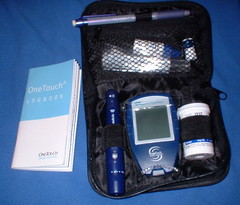 Image by o5com via FlickrYou might have heard the term “gestational diabetes,” but what is it exactly? Well gestational diabetes is what women can get while they’re pregnant, being one of the most common pregnancy complications. Often, there aren’t any symptoms that women who get gestation diabetes, but rather this condition is detected through screening measures. Before you run out and see if you have it or not, there are six risk factors that your doctor will take into consideration before having you tested.
Image by o5com via FlickrYou might have heard the term “gestational diabetes,” but what is it exactly? Well gestational diabetes is what women can get while they’re pregnant, being one of the most common pregnancy complications. Often, there aren’t any symptoms that women who get gestation diabetes, but rather this condition is detected through screening measures. Before you run out and see if you have it or not, there are six risk factors that your doctor will take into consideration before having you tested. The first risk factor is your age. If you are older then twenty five years, you are at more of a risk than a women under twenty five. Your ethnicity also plays a part, with non-Hispanic Caucasian women having the lowest risk than other ethnicities. If you are overweight before the pregnancy, you run a higher risk and if you had problems with your blood sugar being too high before the pregnancy, chances are you’ll have this condition. The last two factors are whether your family has a history of diabetes or not, and your previous pregnancy outcomes. If you developed gestational diabetes in a previous pregnancy, chances are you’ll get it again, or if you had a a baby that weighed more than nine pounds, your risk is higher.
If you want to lower your risk of getting gestational diabetes when you’re pregnant, there are some things that you can do. The first one is to make sure that you are eating healthy. If you lower the sugar and carbohydrates, and eat more fiber, you’ll lower you risk. If you do that before you get pregnant and keep it up during pregnancy, you’ll really lower your chances. The other way is to be more physically active. Don’t stop exercising just because you’re pregnant, but keep active. No you don’t and probably shouldn’t be running marathons, but go for walks, take trips to the mall, park or wherever you like.
If you have any questions on how gestational diabetes can effect your feet, or just pregnancy in general effecting your feet, contact us at East Penn Foot & Ankle Associates.



